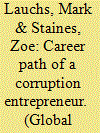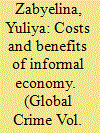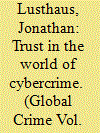| Srl | Item |
| 1 |
ID:
112631


|
|
|
|
|
| Publication |
2012.
|
| Summary/Abstract |
The study of criminal career paths is necessary to understand the methods of success employed by high-performing criminals. The aim of this article is to focus on the career path of Jack Herbert who set up and maintained extensive corruption networks between organised crime groups and police in the Australian state of Queensland. This study builds on Morselli's work on the career paths of Sammy Gravano and Howard Marks that demonstrate how understanding social networks is an essential part of comprehending how organised criminals succeed. The data for this study were taken from the transcripts of the Fitzgerald Commission of Inquiry, which uncovered the extensive and resilient corruption network operated by Herbert. Herbert's relationships have been plotted to establish the nature of his operations. The findings indicate that communication of trust both allows for success and sets the boundaries of a network. Most importantly, this case study identifies Herbert's reliance on holding a monopoly as the cornerstone of his network power and position. This article adds to the literature on criminal career paths by moving away from a classic organised criminal grouping into the area of police corruption and uncovers the distinctive opportunities that this position offers the career criminal.
|
|
|
|
|
|
|
|
|
|
|
|
|
|
|
|
| 2 |
ID:
112630


|
|
|
|
|
| Publication |
2012.
|
| Summary/Abstract |
According to IMF and OSCE reports, informal economic transactions in Russia and other states of the former Communist Bloc have cushioned the shocks of economic and political transition of the 1990s by quickly satisfying the consumer demand and providing unofficial jobs to the population faced with transition recession. As these analyses extensively emphasise the advantages of informal entrepreneurship and its positive contribution to stimulating economic growth, this article explores the phenomenon of shuttle trade - a system/form of informal trade outside state control that does not comply with state regulations - as an issue of concern for criminologists. This article investigates the convergence of shuttle trade and criminal activities and the relationship of shuttle trade to the formal regulatory environment. It offers insights into selected criminal activities at Cherkizovsky market in Moscow before its shutdown in 2009 and an evaluation of the policymaking decisions the shutdown triggered.
|
|
|
|
|
|
|
|
|
|
|
|
|
|
|
|
| 3 |
ID:
112629


|
|
|
|
|
| Publication |
2012.
|
| Summary/Abstract |
For cybercriminals, the anonymity of the Internet offers not only opportunities but also challenges. Where one does not truly know whom one is doing business with, it makes it difficult to assess trustworthiness or to retaliate should dealings go sour and agreements need to be enforced. This creates a large deficit of trust, beyond even that common among conventional criminals, and makes cybercriminal transactions very unstable. As a result, it might be expected that cybercriminals would often act alone. But, in reality, cybercriminals collaborate quite widely. This is the puzzle that this article addresses. In order to overcome the major challenges of online anonymity, and to capitalise on its benefits, cybercriminals have developed a range of mechanisms that buttress trust. These include mechanisms relating to (1) establishing cybercriminal identities; (2) assessing cybercriminal attributes; and (3) extra-legal governance.
|
|
|
|
|
|
|
|
|
|
|
|
|
|
|
|